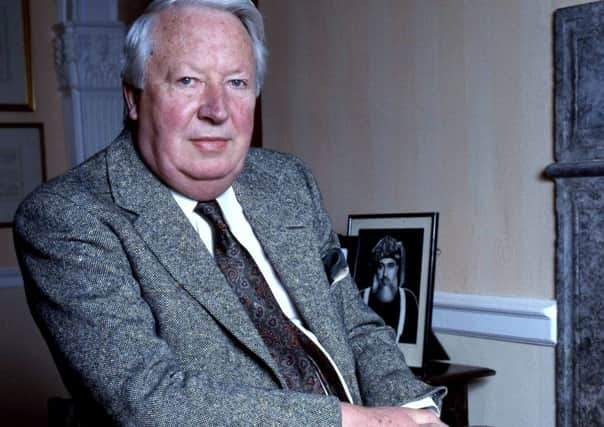Ted Heath kept the EEC's federal aims from the public


Is it just me or does anyone else recall the previous white paper when we were negotiating entry in 1971?
Every household was sent a copy. Mine is tastefully framed and hangs in the smallest room,the paper being too hard for more practical use there.
Advertisement
Hide AdAdvertisement
Hide AdBelow is a reminder of what happened then for those more elderly remoaners who were around at the time but now plead Alzheimer’s or (self induced?) amnesia.


To the youngsters “born in captivity” and knowing no better I recommend looking up the uplifting promise about truth and freedom in John 8:32.
In the 1971 white paper PM Edward Heath wrote “There is no question of Britain losing essential sovereignty.” This assertion is at odds with what Heath verifiably already knew about the EEC and its plans. He knew in advice from both senior legal and foreign office sources and indeed from his own personal meetings as Britain’s negotiator for EEC entry.
As early as 1960 Dr Hallstein, EEC Commission President, told Heath, face to face, that the ultimate aim of the European project was federation and in joining Britain had to accept that.
Advertisement
Hide AdAdvertisement
Hide AdIn November 1960 Heath asked Lord Kilmuir, Lord Chancellor, for an assessment.


The reply is long but I think this quote sums up Kilmuir’s strong misgivings.
“I must emphasise that in my view the surrenders of sovereignty involved are serious ones, and I think that, as a matter of practical politics, it will not be easy to persuade Parliament or the British public to accept them.
“I am sure that it would be a great mistake to underestimate the force of the objections to them. But these objections should be brought out into the open now because, if we attempt to gloss over them at this stage, those who are opposed to the whole idea of joining the Community will certainly seize on them with more damaging effect later on”.
Prophetic?
Advertisement
Hide AdAdvertisement
Hide AdIn 1970 the EEC commissioned a report by Pierre Werner PM of Luxembourg. Having seen it the Foreign Office fears were set out by Con O’Neill in a note (published under the 30 year rule) to Heath, now P.M. O’Neill wrote that Werner’s report envisaged “a process of fundamental political importance, implying progressive development towards a political union”.
The long-term objectives of economic and monetary union, it was made clear to Mr Heath, “are very far-reaching indeed”, going “well beyond the full establishment of a Common Market”.
The Werner plan could lead to,“the ultimate creation of a European federal state, with a single currency. All the basic instruments of national economic management (fiscal, monetary, incomes and regional policies) would ultimately be handed over to the central federal authorities. The Werner report suggests that this radical transformation of present Communities should be accomplished within a decade”. (PRO/FCO 30/789)
All this Heath kept from the public and we blithely voted to join, not federal Europe ruled from abroad, but as we were told, just a common market. Something that seemed to make good economic sense even if some saw it as doing the dirty on our Commonwealth trading partners.
Advertisement
Hide AdAdvertisement
Hide AdTo add insult to injury Heath even abjectly succumbed to the blackmail and robbery of our good cold water fishing by the Common Fisheries Policy, passed illegally by the incumbent gang of six with no opportunity for Britain to vote, as the price for joining.
When asked on TV in 1973 to explain his lack of honestly Heath merely sneered “The British public are too ignorant to be involved in governing themselves.” He imagined this justified his behaviour. Clearly present day remoaners agree.
Well we’re not and it doesn’t.
They would do well to understand that. Cameron didn’t. Where is he now?
Davy Wight, Carrickfergus